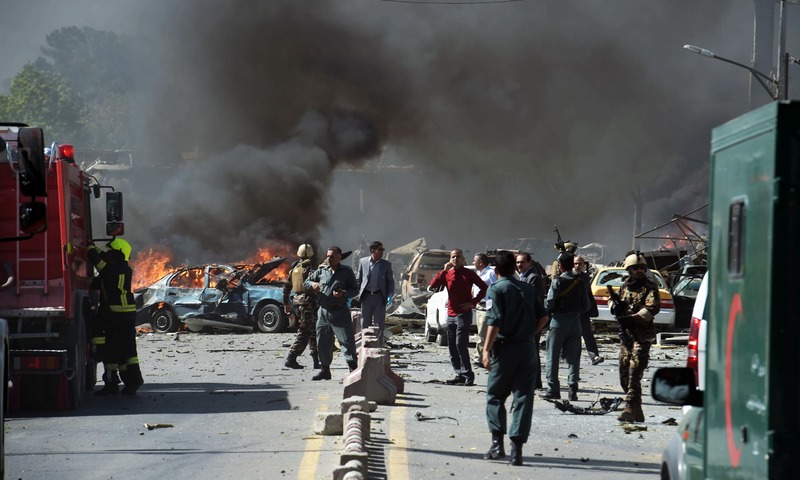Kabul’s crisis
April 30, 2018 | Expert Insights

Deadly twin blasts in Kabul have resulted in the deaths of at least 29 people including 9 journalists in the region. This is the second such similar attack to take place in Kabul in April 2018.
Background
Landlocked and mountainous, Afghanistan is one of the most unstable nations in the world. Much of its economy and its infrastructure are in ruins and the nation relies heavily on foreign aid. The region is home to multiple terror groups such as ISIS, Taliban, al Qaeda and Daesh.
This chronic instability has forced many citizens to become refugees. The region is plagued by multiple terror attacks. Kabul is regularly shaken by suicide bomb attacks. Within the first half of 2017, reports have suggested that terror attacks had resulted in the deaths of at least 1,662 people.
In the first two months of 2018, the terror attacks in Afghanistan by the Taliban increased exponentially. On 29th January 2018, explosions and gunfire erupted near the main military academy in Kabul, as officials and witnesses feared insurgents had entered another heavily guarded compound. In the same month, an ambulance packed with explosives killed at least 100 people. The Taliban took responsibility for the attacks.
Analysis
In April 2018, a suicide bomb attack in Kabul, the capital of Afghanistan, has resulted in the deaths of at least 57 people. In addition, there was another bombing at Baghlan, resulting in the deaths of at least 6 people. Both the bombings occurred at places where voter registration was taking place. At least a hundred people were injured. The elections are slated to take place in October 2018.
At least 29 people have died in a coordinated double suicide bombing at Kabul. During the second attack, a bomber disguised as a cameraman detonated the bomb and killed at least 9 journalists as a result. This included a senior AFP photographer as well. The second attack was geared at targeting people who would respond to help the wounded from the first bombing.
In addition, at least 45 people were wounded in the attacks. Four officers were among those who were killed. The first blast took place at around at 8 a.m. local time in the Shashdarak area of the city, where the US embassy and Afghan government buildings are located, prompting journalists to rush to the scene. AFP later confirmed that its senior photographer, Shah Marai, had also been killed during the attack.
US Ambassador John Bass condemned the attack. "I condemn today's terrible Kabul attack (and) reaffirm our commitment (to) stand with the Afghan people in their fight for peace (and) security across Afghanistan. We mourn for those murdered, including the brave journalists who stand for truth in the face of violence," he wrote on Twitter.
In 2017, it was reported that Afghanistan has become the second deadliest country for journalists. In 2016, 13 journalists were killed during their line of duty. "This increase in violence against journalists has turned Afghanistan into the second most dangerous country for journalists in the world, after Syria," Najib Sharifi, chairman of the committee said at the time.
The attack comes just a day after India and China announced that the countries would jointly work on an economic project in Afghanistan. India has heavily invested in developing the infrastructure in Afghanistan and has helped with nation-building initiatives.
The attack comes just weeks after Afghan President Ashraf Ghani put forth an extraordinary offer to bring peace to the region. He said that he would move to officially recognize the Taliban as a legitimate political group in the region. He also asked the group to come to the negotiating table with any “precondition”. The group, meanwhile, has noted that it wants to directly negotiate with the US administration.
Assessment
Our assessment is that the increased number of violent attacks comes during a period where the government has reached out to the Taliban in an effort to bring forth peace. If the government is in the near future able to negotiate an agreement with the Taliban, ISIS still remains a looming threat to Kabul. Can nation-building efforts by countries like India, China or the US help during such a tumultuous period in the country?








Comments